Direct and Indirect Speech of Interrogative Sentences into statements, maintaining proper punctuation and grammatical rules has been discussed in the following. Explore how to use reporting verbs, change word order, and use appropriate tone to convey the meaning of the original question for the direct indirect speech of interrogative sentences.
Direct Speech of Interrogative Sentences
Direct speech refers to the exact words spoken by a person, enclosed within quotation marks. An interrogative sentence direct speech is a type of sentence that asks a question and requires an answer. We form interrogative sentences by using an auxiliary verb and subject-verb inversion. We use these sentences to gather information, express curiosity, or initiate a conversation.
For examples,
- He said to me, “Do you like pizza?”
- The teacher said to me, “What is your name?”
- She said to me, “Where do you live?” etc.
People also ask
Indirect Speech of Interrogative Sentences
Indirect speech, or reported speech, reports what someone else has said without using their exact words. Instead, it paraphrases or summarizes the original statement. However, the interrogative reported speech turns into a statement or assertive sentence in indirect speech.
For examples,
- He asked me if I liked pizza.
- The teacher asked me what my name was.
- She asked me where I lived.
Direct and Indirect Speech of Interrogative Sentences Examples
In direct narration, interrogative reported speech is introduced with an auxiliary verb or a question word.
For example:
(a) Auxiliary Verb Introduction
Direct: He said to me, “Are you ill?
Indirect: He asked me if I was ill.
Direct: He said to me, “Have you done it?”
Indirect: He asked me if I had done it.
(b) Wh-Word Introduction
Direct: The teacher said to me, “Why are you late?”
Indirect: The teacher asked me why I was late.
Direct: You said to me, “How did you do the work?”
Indirect: You asked me how I had done the work.
(c) Ending with an Interrogation mark.
In direct speech, the sentence normally ends with a note of interrogation or (?). However, in indirect speech of interrogative sentences, the sentences turn into a statement.
Direct: The teacher said to me, “Why are you late?”
Indirect: The teacher asked me why I was late.
Direct: He said to me, “Have you done it?”
Indirect: He asked me if I had done it.
Rules for Shifting Direct and Indirect Speech of Interrogative Sentences
Study the following rules on how to change direct speech to indirect speech of Interrogative sentences with proper reporting verbs, change word order, and punctuation marks.
Rule 1: Understanding Reported Speech in Direct Narration
The first thing to remember, find out which kind of sentence it is in the quotation mark or inverted commas under direct narration.
For example,
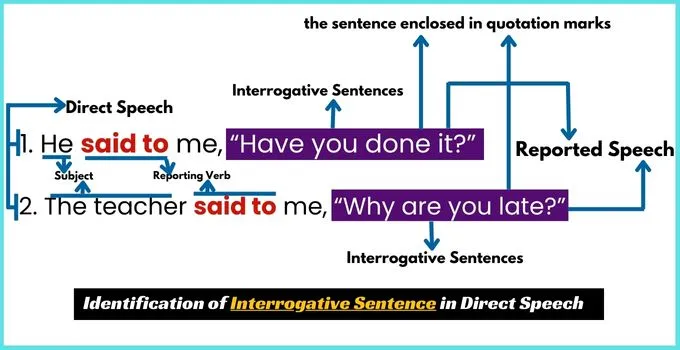
From the example provided above, we observe that the sentence “Have you done it?” is enclosed within quotation marks or inverted commas in direct narration and begins with a question mark. Hence, we can identify it as an interrogative sentence.
Next, we need to introduce the appropriate rules for transforming direct speech into indirect speech for interrogative sentences.
Direct: He said to me, ‘Will you go there?’
Indirect: He asked me if I would go there.
Direct: I said to him, ‘How did you enjoy the movie?’
Indirect: I asked him how he had enjoyed the movie.
Direct: “Are you coming to the party?”
Indirect: She asked if I was coming to the party.
Direct: “Did you finish your homework?”
Indirect: He wanted to know if I had finished my homework.
Direct: “Have you seen my keys?”
Indirect: She wondered if I had seen her keys.
Direct: “Could you lend me some money?”
Indirect: He asked if I could lend him some money.
Direct: “Where is the nearest post office?”
Indirect: He asked where the nearest post office was.
Direct: “When did they arrive?”
Indirect: She wondered when they had arrived.
Direct: “Why did you leave so early?”
Indirect: The boss asked why I had left so early.
Direct: “Whose book is this?”
Indirect: He wanted to know whose book that was.
Rule 2: Changes of Reporting Verb Direct and Indirect Speech of Interrogative Sentences
In Indirect Narration, interrogative Verbs such as “ask”, “enquire”, “demand”, “want to know” etc are used as reporting Verbs before the reported Speech in place of simple verbs “say” or “tell”.
For example,
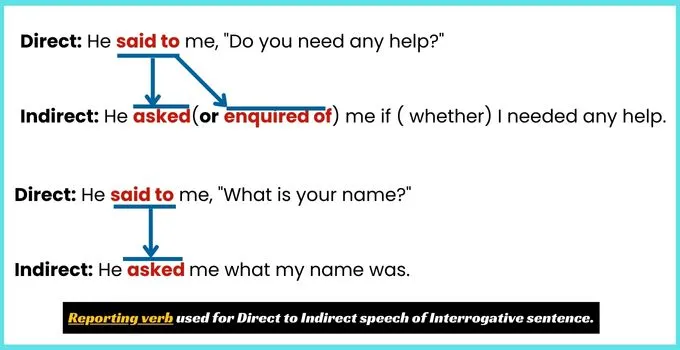
Direct: “Are you coming to the party?” she asked.
Indirect: She asked if I was coming to the party.
Direct: “Do you need any help?” he enquired.
Indirect: He enquired if I needed any help.
Direct: “Where is the nearest ATM?” she wanted to know.
Indirect: She wanted to know where the nearest ATM was.
Direct: “Why didn’t you attend the meeting?” they demanded.
Indirect: They asked why I hadn’t attended the meeting.
Direct: “Will you be able to finish the project on time?” he asked.
Indirect: He asked if I would be able to finish the project on time.
Direct: “Are they arriving tomorrow?” she asked.
Indirect: She asked if they were arriving the next day.
Direct: “Have you seen my keys?” he wanted to know.
Indirect: He wanted to know if I had seen his keys.
Direct: “Did you complete the assignment?” she asked.
Indirect: She asked if I had completed the assignment.
Direct: “Can you help me with this problem?” he enquired.
Indirect: He enquired if I could help him with that problem.
Direct: “How long will the journey take?” she asked.
Indirect: She asked how long the journey would take.
Direct: He said to me, ‘When will the down train arrive?’
Indirect: He inquired of me when the down train would arrive.
Direct: I said to him, ‘Where is the post office?’
Indirect: I wanted to know where the post office was.
Rule 3: Interrogative sentences with Yes/No answers (non ‘wh-word’) Examples
If the reported speech in Direct Narration is introduced by Verbs like “ be”, “have”, “and do”, or any other auxiliary Verbs like “can”, “shall”, or “will”, or (in a simpler way, the Questions that can be answered by Yes, or No,) the connective “ if ”, “whether” is used after the reporting verb or object of the reporting verb in the Indirect Narration.
For example,
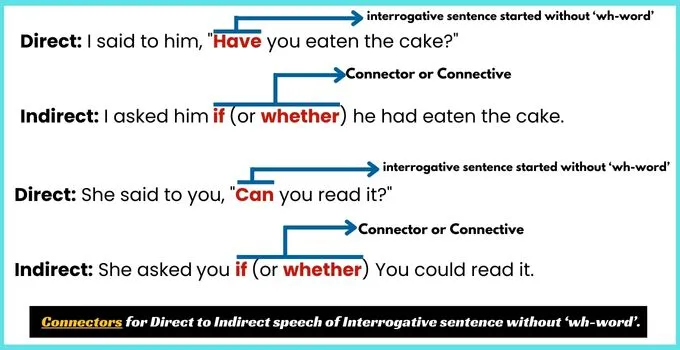
Direct: I asked him, ‘Have you eaten the cake?’
Indirect: I asked him if/whether he had eaten the cake.
Direct: He asked the boy, ‘Did you pass the exam?’
Indirect: He asked the boy if/whether he had passed the exam.
Direct: She said, “Did you finish the report?”
Indirect: She asked if I had finished the report.
Direct: He said, “Are you going to the concert?”
Indirect: He inquired whether I was going to the concert.
Direct: The manager said, “Will she be attending the meeting?”
Indirect: The manager wanted to know if she would be attending the meeting.
Direct: Thet said, “Have they decided on a location?”
Indirect: They asked if a location had been decided on.
Direct: She said, “Can you help me with this assignment?”
Indirect: She wondered if I could help her with the assignment.
Rule 4: Interrogative sentences with ‘wh-word’
If the Reported Speech in Direct Narration is introduced by interrogative pronouns (who, which ) interrogative adjectives (what, how much ), or interrogative adverbs (why, when, where, how ), we can not use the conjunction if ( or whether). Instead, the Wh-Word with which the reported speech of direct narration begins replaces the ‘if’ or ‘whether‘ by that Wh-Word in indirect narration.
For example,

Direct: I said to him, ‘When will you do it?’
Indirect: I asked him when he would do it.
Direct: He said to her, ‘What is your name?’
Indirect: He asked her what her name was.
Direct: He said to her, ‘Whose type-writer are you using?’
Indirect: He inquired of her whose type-writer she was using.
Direct: Father said, ‘Where have you been so long in the sun, my son?’
Indirect: Father inquired of the son where he had been so long in the sun.
Direct: The king said, ‘Who is not ready to die for his land, my countrymen?’
Indirect: The king asked his countrymen who were not ready to die for his land.
Rule 5: Change of Punctuation Mark in Indirect speech of Interrogative sentence.
We have to change The Interrogative Form of the Reported Speech in Direct Narration into a Statement or Assertive Sentence in Indirect Narration. At the end of the sentence of Indirect Narration, we must use a full stop ( . ) instead of a question mark ( ? ). So, in Indirect Narration, the Reported Speech will start with the Subject, then the Verb, and then others.
For example,
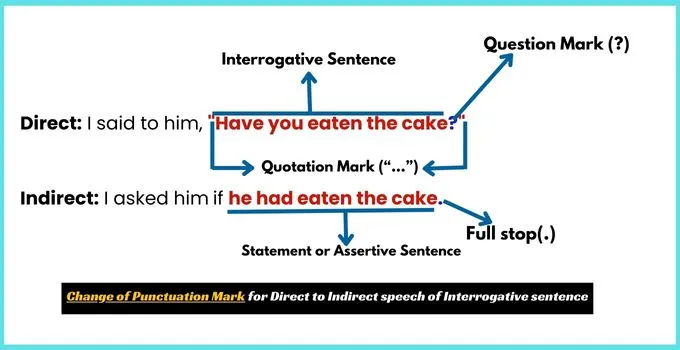
Direct: He said to me, ‘Did you write to me before?’
Indirect: He asked me if I had written to him before.
Direct: He said to you, ‘Can you tell me your address?’
Indirect: He asked you if you could tell him your address.
Direct: She said to him, ‘Will you help me lift this luggage?’
Indirect: She asked him if he would help her lift that luggage.
Rule 6: Interrogative Sentences with Modals in Indirect Speech
An Interrogative Sentence beginning with “Shall” in the Direct Narration, takes the form “would” in the Past Tense in the Indirect Narration. We use “should” only when the statement is a Polite question or involves or implies a matter of propriety or duty.
For example,
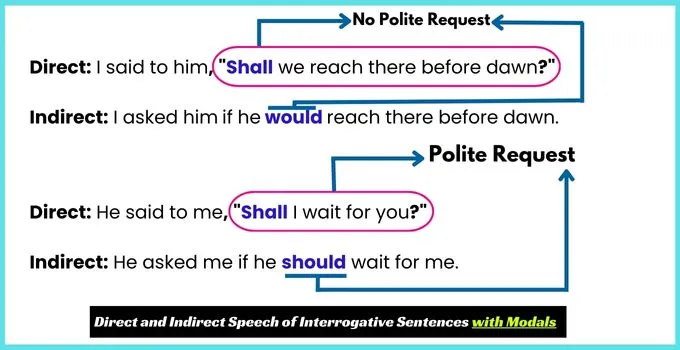
Direct: He said to me, ‘Shall we reach the village before dawn?’
Indirect: He asked me if they would reach the village before dawn.
Direct: They said, ‘Shall we contribute to the Poor Fund?’
Indirect: They asked if they should contribute to the Poor Fund. [polite question]
Direct: Ridhi said to me, ‘Could I be of any help to you?’
Indirect: Ridhi asked me if I could be of any help to her.
Rule 7: Direct to Indirect Speech with Tag Questions
Sentence with Question Tags: Sometimes an Interrogative sentence is formed in the Direct Narration by adding some Interrogative Tags to an Assertive sentence.
In Indirect Narration, the tag is omitted after the meaning of the sentence(Affirmation or Negation) has been guessed from it. Sometimes different verbs such as “ think ”, “ hope ”, “ believe ”, and “ ask ” may be used to express that idea in an Indirect Form.
For example,
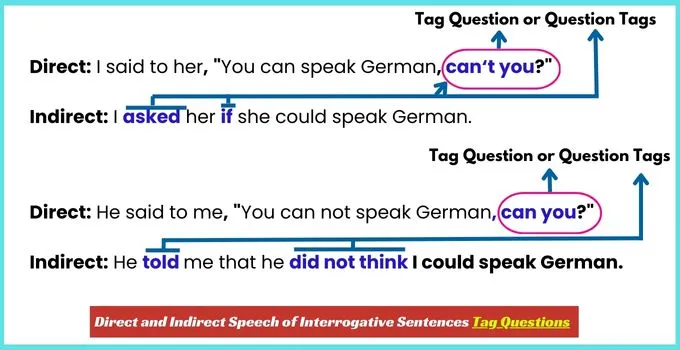
Direct: Robert said, ‘John is a good boy, isn’t it?’
Indirect: Robert said that he thought that John was a good boy.
Direct: Robin said, ‘The captain did not agree to go, did he?’
Indirect: Robin said that believed that the captain had not agreed to go.
Direct: The teacher said to the boy, ‘You will do the job, won’t you?’
Indirect: The teacher told the boy that he hoped he (the boy) would do the job.
Direct: He said, ‘You are going to market, aren’t you?’
Indirect: He asked me if it was true that I was going to market.
Rule 8: Changes in Persons for Interrogative Sentences
Get the rules on how to make Changes in Persons in indirect narration on the previous page under the General Rules section.
When transforming interrogative sentences from direct to indirect speech, there are changes in the persons involved. Here’s how these changes occur:
Table: Changes in Persons
| Direct Speech | Indirect Speech |
|---|---|
| First person (I, we) | First-person (subjective pronouns) change according to the reporting situation. |
| Second person (you) | Second person (subjective pronouns) change according to the reporting situation. |
| Third person (he, she, it, they) | Third person (subjective pronouns) remain unchanged in indirect speech. |
Examples:
First Person:
Direct: She asked, “Can I help you?”
Indirect: She asked if she could help me.
Second Person:
Direct: He asked me, “Are you coming?”
Indirect: He asked if I was coming.
Third Person:
Direct: They asked, “Is she okay?”
Indirect: They asked if she was okay.
Rule 9: Change the Tense of Reporting Verb for Interrogative Sentences
Study the rules to change the tense of the Reporting Verb in Indirect Narration and the Verb of the reported speech in indirect narration by going to the above link which is the General Rules section on the previous page.
When converting interrogative sentences from direct to indirect speech, not only the tense of the reporting verb changes, but also its form. Here’s how the tense and forms of the reporting verb are altered:
Table: Change of Tense and Forms
| Direct Speech | Indirect Speech |
|---|---|
| Present Simple | Changes to past simple tense and form. |
| Present Continuous | Changes to past continuous tense and form. |
| Present Perfect | Changes to past perfect tense and form. |
| Past Simple | Remains unchanged in indirect speech. For example: |
| Past Continuous | Changes to past perfect continuous tense and form. |
Examples:
Present Simple:
Direct: He asked, “Do you like ice cream?”
Indirect: He asked if I liked ice cream.
Present Continuous:
Direct: She asked, “Are you watching TV?”
Indirect: She asked if I was watching TV.
Present Perfect:
Direct: They asked, “Have you finished your homework?”
Indirect: They asked if I had finished my homework.
Past Simple:
Direct: He asked, “Did you enjoy the movie?”
Indirect: He asked if I enjoyed the movie.
Past Continuous:
Direct: She asked, “Were you studying all night?”
Indirect: She asked if I had been studying all night.
Work Out Exercises of Interrogative Sentences Direct and Indirect Speech:
Note carefully the Changes in Interrogative Sentences from Direct Speech to Indirect Speech.
Direct: I said to the boy, “Did you go to school?”
Indirect: I asked (enquired of) the boy if he had gone to school.
Direct: “Is not poverty a curse?” my father said to me.
Indirect: My father asked me if poverty was (is) not a curse.
Direct: “Are you weeping?” he asked her.
Indirect: He asked her if she was weeping.
Direct: “Have you brought a pen for me?” the girl said to her father.
Indirect: The girl asked her father if he had brought a pen for her.
Direct: “Can you see a woman seated at a table?” he asked her.
Indirect: He asked her if she could see a woman seated at a table.
Direct: Persome said, “Marie, isn’t the soup boiling yet?”
Indirect: Persome asked Marie if the soup was not boiling by that time.
Direct: “Would you sing for our visitors?” my mother said to my sister.
Indirect: My mother asked my sister if she would sing for our visitors.
Direct: He said to me, “What are you doing ?”
Indirect: He asked me what I was doing.
Direct: He said to me, “When will you go home ?”
Indirect: He enquired of me when I would go home.
Direct: You said to me, “Why have you failed ?”
Indirect: You asked me why I had failed.
Direct: He said to me, “Who has gone to the sea ?”
Indirect: He asked me who had gone to the sea.
Solved Exam Questions Answers 2024:
Direct: Reba said, “Which book is mine ?”
Indirect: Reba asked which book was hers.
Direct: He said to me, “When will the down train arrive ?”
Indirect: He inquired of me when the down train would arrive.
Direct: Mina said, “Why must I stay ?”
Indirect: Mina asked why she must stay.
Direct: He said, “Where is the post office?”
Indirect: He wanted to know where the post office was.
Direct: He said, “How will the Sherpa climb the peak ?”
Indirect: He wondered how the Sherpa would climb the peak.
Direct: She said to me, “Maya can’t speak Hindi, can she”?
Indirect: She told me that she didn’t think Maya could speak Hindi.
Direct: Amal said, “They will not go, will they”?
Indirect: Amal hoped they would not go.
Direct: He said to me, “You are going to the playground, aren’t you?”
Indirect: He asked me whether it was true that I was going to the playground.
Change the following sentences from Direct to Indirect Speech of Interrogative Sentences:
1. Ram said to his friends, “Do you want to go to Kolkata with me ?”
2.”Shall we send it to your flat ?” he said.
3. Rina said to Samir, “Are you going today ?”
4. Pradeep said to me, “When will you go home ?”
5. “Whom do you want ?” he said to her.
6. He said to Rita “How is your father ?”
7. “Who told you about my success ?” she said to her friend.
8. The lady said to the man, “May I park my car here ?”
9. “Who has dared to wound you ?” cried the Giant.
10. The workers said to the manager, “When do you like to talk to us ?”
11. The poor woman said, “Will none of you help me today ?”
12. “Can you find your way home ? said I to the little boy.
13. “Which way did you see the thief go ?” asked the policeman.
14. He said to the girl, “Don’t you know my sister ?”
Report the following into Indirect Speech
Turn the following sentences from Direct to Indirect Speech
1. “Have you anything to say on behalf of the prisoner ?”. said the judge to the lawyers.
2. The traveller said, “Are you really telling me the truth ?”
3. He said to the strangers, “Who are you ?”
4. Sanat said to Debu, “Where have you kept my pen ?”
5. She said to the boy, “What are you doing here ?”
6. He said, “What do you want ?”
7. He said to John, “Why are you shouting ?”
8. “Who is our master ?” asked William Tell.
9. Babu said to the stranger, “Who are you?”
10. Pompi said, “Which of the pens do you need ?”
11. “Where do you live”, he asked
Frequently asked questions
1. Q: What is an example of direct and indirect speech of an interrogative sentence?
Ans: Interrogative sentence Direct Speech Example: I said to the boy, “Did you go to school?”
Interrogative sentence Indirect Speech Example: I asked (enquired of) the boy if he had gone to school.
2. Q: What is an example of an interrogative sentence indirect?
Ans: interrogative sentence indirect: My father asked me if poverty was (is) not a curse.
3. Q: What is an example of a direct speech for an interrogative sentence?
Ans: Interrogative sentence Direct Speech: “Is not poverty a curse?” my father said to me.
4. Q: What are 10 examples of interrogative?
Ans:
What is your name?
How old are you?
Why have you done this?
When will you go?
Which shirt do you like?
Whose car is this?
Whom do you prefer most?
Have you done this before?
Did you notice that?
Will he make it?
5. Q: What are the 7 interrogative words?
Ans: What, When, Who, Whose, Whom, How, Why.







